
Russian President Vladimir Putin has ordered troops into two separatist regions in eastern Ukraine, drawing sharp rebukes from the U.S. and other Western countries that have warned for weeks of a Russian invasion of Ukraine. The Biden administration issued new sanctions, and Germany has stopped the certification of Russia’s Nord Stream 2 gas pipeline in an attempt to quash the country’s dependence on Russian natural gas. We speak with Nina Khrushcheva, professor of international affairs at The New School, who says she remains skeptical that Russia will launch an all-out war against Ukraine. She also says Russia’s recent attempts at allying with China should not be perceived as a threat, as “China is not going to make up for all the losses that the upcoming sanctions will bring onto Russia.”
Transcript
AMY GOODMAN: Russian President Vladimir Putin has sent troops into two separatist regions in eastern Ukraine, shortly after recognizing them as independent states. Putin made the announcement Monday during a speech where he questioned the legitimacy of Ukraine as a state.
PRESIDENT VLADIMIR PUTIN: [translated] I consider it necessary to make a long-overdue decision to immediately recognize the independence and sovereignty of the Donetsk People’s Republic and the Luhansk People’s Republic.
AMY GOODMAN: The two Russian-backed regions had broken away from Ukraine in 2014, leading to a conflict that has left 14,000 people dead. While Russia supported the separatists eight years ago, Moscow did not recognize the self-proclaimed Donetsk People’s Republic and Luhansk People’s Republic as independent states until Monday. In recent days, the Ukrainian government and Russian-backed separatists in the region have accused each other of violating a ceasefire agreement. On Monday, a spokesperson for the United Nations secretary-general condemned Putin’s decision.
STÉPHANE DUJARRIC: The secretary-general considers the decision of the Russian Federation to be a violation of the territorial integrity and sovereignty of Ukraine and inconsistent with the principles of the Charter of the United Nations.
AMY GOODMAN: During an emergency meeting of the U.N. Security Council last night, U.S. Ambassador Linda Thomas-Greenfield also criticized Putin’s move.
LINDA THOMAS-GREENFIELD: Russia’s clear attack on Ukraine’s sovereignty and territorial integrity is unprovoked. It is an attack on Ukraine’s status, a U.N. member state. It violates a basic principle of international law, and it defies our Charter. What is more, this move by President Putin is clearly the basis for Russia’s attempt to create a pretext for a further invasion of Ukraine. The consequences of this action will be felt far beyond Ukraine’s borders.
AMY GOODMAN: Russia’s U.N. ambassador claimed Russia was forced to take action in the Donbas region.
VASSILY NEBENZIA: [translated] We remain open to diplomacy, for a diplomatic solution; however, allowing a new bloodbath in Donbas is something we do not intend to do. Unfortunately, we are forced to note the extremely negative role played in all of this by our Western colleagues, led by the United States. Instead of forcing Kyiv to implement its obligations, they have merely been openly egging Ukraine on, repeating the meaningless mantra that the obligations under the Minsk agreement are not being implemented by Russia, which, as we’ve repeatedly underscored, is not even a party to the Minsk agreements.
AMY GOODMAN: Ukrainian President Volodymyr Zelensky accused Russia of violating the Minsk agreement and undermining diplomatic efforts to resolve the conflict in eastern Ukraine. On Monday, the Biden administration issued limited new sanctions targeting investors in the Russian-backed separatist regions. More sanctions are expected to be announced today. Meanwhile, Germany has announced it’s halting the permitting process of Russia’s massive Nord Stream 2 gas pipeline. The big question now: What will Putin do next? Russia has as many as 190,000 troops near the Ukrainian border. Meanwhile, the United States has sent troops to Eastern Europe, while the U.S. and other NATO allies have increased arms shipments to Ukraine in recent weeks.
We’re joined now by Nina Khrushcheva, professor of international affairs at The New School, co-author of In Putin’s Footsteps: Searching for the Soul of an Empire Across Russia’s Eleven Time Zones, also the book The Lost Khrushchev: Journey into the Gulag of the Russian Mind. She’s the great-granddaughter of the former Soviet Premier Nikita Khrushchev. Her latest piece for Project Syndicate is headlined “Putin Is No Nixon.”
Professor Khrushcheva, welcome back to Democracy Now! We spoke to you, oh, just over a month ago. You were in Moscow at the time. Can you first just respond to the latest developments? The significance of Putin’s hour-long address yesterday and declaring the separatist areas of Ukraine independent states?
NINA KHRUSHCHEVA: Thank you, Amy. A lot has changed in a month, or not much has changed, in some way, because we’re still waiting for the big invasion. I want to correct — not even correct, but sort of amend a little bit the statements about the Russian troops going into, or peacekeepers going into, Donbas and Luhansk: It actually hasn’t happened yet. And, in fact, the minister of foreign affairs said very prominently that they’re holding on on this decision, and the separatist leaders said that it’s their decision when they’re going to ask for peacekeeping. So, in some ways, it does look today that the decision was made to recognize the republics as independent states, but Putin at this point stops here, and could be a sign of he is slightly blinking and waiting for the further developments on the Ukrainian side, on the Russian side to move forward. So, this is something that I find, especially in studying criminology, is very important, this little words and steps that are being made and said.
Yesterday’s speech was remarkable, in many kind of revisionist versions of history. And what was clear in the speech, in all the rhetoric that was being put forward, is that the addressee of this speech were not Ukrainians, were not even Russians. It was the United States, is that — that’s how we see our situation. And we are looking at Ukraine as your — as he said, your client state, and you deal with your client state so it wouldn’t be riling the Russian bear — or, he did not say these words, but basically was all about “do not further rile the Russian bear,” because if we’re recognizing — I mean, we have recognized, and it seems to me that that’s “we’re willing to stop for now, but it does depend on your kind of diplomacy, your kind of political decisions,” and so on and so forth. The rhetoric was tremendous. It was the knife at the Russian throat, that Russia was a victim of — giant Russia, 11 time zones, that you mentioned in my book — the giant Russia was a victim of Ukraine manipulation. Ukraine didn’t exist — only exists only because Vladimir Lenin made it so, because, otherwise, it would have been much smaller, because it was much smaller, supposedly, in the times of the Russian Empire. So, if you wanted to communize Ukrainians, we can show you how to — you do it. So, there were all these threats, that can be metaphorical but also can turn into something much more than metaphorical and become military.
So, what I know from Moscow and friends in Kyiv, I mean, everybody is on — and in Europe, everybody is on edge and do look for further statements or further actions of Putin. But, once again, as when we spoke a month ago, I still don’t see the big invasion. I can be completely wrong; I will be washing my mouth with soap tomorrow. But so far I think that that’s what Putin’s message to the West is, is that I made my point, to all this giant rhetoric, that I’m going to go to Kyiv. I have to be — I have to sort of show my military or my firm prowess. But at this point we’re still not where Joe Biden says we are — that is, in the next few days or next even next few weeks, Putin is ready to go to Kyiv.
JUAN GONZÁLEZ: Professor, I wanted to ask you — I listened to Putin’s speech, at least the translation, on C-SPAN, and it seemed to me that he was attempting, as you say, a revisionist history, but he was also raising significant criticisms. He basically blamed Lenin for creating this idea that republics of the Soviet Union had the right of self-determination to secede and that somehow that Stalin had a much more control orientation toward the creation of the Soviet Union. But I’m wondering, in terms of the — your great-grandfather, for decades, was the leader of the Communist Party in Ukraine. And, in fact, under — it was under Khrushchev that the Soviet Union turned over Crimea to Ukraine. Isn’t there some truth to the fact that during the Soviet period, more territory was added to what is currently the state of Ukraine? Clearly, the Ukrainian people have always existed, but there was a period where Ukraine grew as a result of political decisions made after World War II and by the Soviet government to increase its size. And I’m wondering your thoughts on that.
NINA KHRUSHCHEVA: Well, thank you. Yes, it was — I mean, and Putin is not a fan of Lenin. We know that. He doesn’t like revolutions, so he doesn’t like the revolution of 1917. He always thinks that Russia under the tsars was much grander and, you know, had more gold and more palaces, and we know he loves palaces, under the tsars. So, that’s a given. So, it’s always sort of this nasty comments towards Lenin, as well: As Ukrainians, you don’t like Lenin, but he’s the one who gave you all of it.
As far as Khrushchev, yes — and Khrushchev was in love with Ukraine. I mean, he was a Russian-born, but he spent a lot of years in Donbas, in fact, now that self-proclaimed republic, loved Ukraine. You had this wonderful song, Ukrainian song, at the beginning of the program, and he would have cried, because in the evening he would always like to listen to Ukrainian songs and actually sang them, so he was a great, great fan.
It’s a little bit of mythology that it is under him Crimea became Ukrainian and was transferred from Russia to Ukraine. It was 1954. He was the head of the Communist Party, but he was not the head of the state, he was not the head of the government. So, there is no signature under any of this documents that transferred Crimea to the Russian Federation. It was a collective leadership, at the time it was called. So it was a mutual decision, of course, with his recommendation. He thought it would be proper for managerial purposes. But, really, it’s much more. I mean, he is — since he’s a Putin villain, in a sense, since Khrushchev denounced Stalin, as it is well known, at the 20th Party Congress in a secret speech in 1956, and therefore he’s sort of made as a villain for kind of one of those — along with Mikhail Gorbachev during perestroika, as one of those reformist leaders who shed the Russian lands, while people like Stalin, and now like Putin, they are putting them together. So, I think that is something important to clarify.
But regardless of how Russians feel about Crimea, for example, legally, it is not — Ukraine was an independent state, became an independent state in ’91. And so, in international law, the Crimea obviously is Ukrainian territory, and so is Donetsk and Luhansk. But, for now, I think Putin is willing to stop here.
JUAN GONZÁLEZ: Yeah, and I’m wondering — there was an interesting op-ed piece by Thomas Friedman in The New York Times today, and I’m usually not a fan of Thomas Friedman, but he did raise — he’s one of the few American journalists who has raised — in the commercial media, who has raised what he believes was the grave error of NATO to expand into the former Soviet republics in the 1990s. And he actually quotes in that column an interview he did back in 1998 with George Kennan, the longtime ambassador to Russia and who was one of the architects of the containment policy. And he says, from that interview in 1998, that Kennan told him, “I think this is the beginning of a new Cold War. I think the Russians will gradually react quite adversely, and it will affect their policies. I think it is a tragic mistake. There was no reason for this whatsoever. No one was threatening anybody else.” That was George Kennan back in 1998 about NATO’s expansion into the East, into Eastern Europe. I’m wondering: To what degree do you think that this Friedman piece is accurate about the roots of what we’re seeing right now?
NINA KHRUSHCHEVA: Well, thank you. I actually have my own George Kennan, so I don’t need Thomas Friedman to know this, because I was George Kennan’s last research assistant in Princeton, in fact, when Friedman was writing that piece in '98. So, I know this kind of point of view of George Kennan's firsthand, because we spoke about it endlessly many, many times, and what a mistake it is. And he was saying he knows the Russian psyche, and for now they’re willing to kind of surrender to the United States and Western leadership or Western policies. But one of the things that he said — and he was absolutely right — I mean, his knowledge of Russian psychology was tremendous. And he said, you know, Russians never follow anybody, so it is a mistake to think that when they get stronger, they’re just going to follow the United States in whatever United States does. Russians don’t follow, and Americans need the followers, and so that’s going to be a problem head on. And it will affect Russian policies, that will consider it is a violation of their own messianic — because one of the things that America and Russia share is the messianic idea that we are benefiting the world — Russia, of course, with its kind of almost murderous equality of everything and the beautiful Russian soul that equates all the measures of man, and America with its messianic idea of how everybody should be equally comfortable.
And so, Kennan was very big — was very critical of this and, in fact, explained that, you know, first Gorbachev was promised not to move an inch to the east, then Yeltsin was promised not to move an inch to the east. Then Yeltsin was told that, “Well, we will have to probably move an inch, but it’s not going to be in your lifetime.” That’s why when Olaf Scholz, meeting with Putin, said, “Well, but Ukraine and Georgia are not going to be admitted in NATO in your lifetime,” Putin laughed at him, that, “Wait a minute, but that was already said before. I have history on my hands,” because one of the reasons I think Putin is acting on politically, because he is the gatherer of lands. So, in history, even if militantly, he would need to go, in history, like Stalin, blood or not, but somebody who doesn’t let Russia to be put on its knees, like Khrushchev did, they see it, and especially like Gorbachev did after the collapse of the Soviet Union during — well, after the collapse of the Soviet Union in '91. So, Kennan was very predictive of that. And, in fact, I think Der Spiegel magazine, the German magazine, just uncovered, just published a few documents where indeed it was discussed that it's not going to move — NATO is not going to move east. And, you know, Russians are now — the official Russians are now citing it left and right, saying that, “Of course we are allowed to act the way we act, because, look, the West is so hypocritical. They cannot teach us how to behave.”
AMY GOODMAN: And, Nina Khrushcheva, 50 years ago yesterday, Chinese leader Mao Zedong met Richard Nixon. Your latest piece is “Putin Is No Nixon.” As we wrap up, if you could briefly comment on the Putin-China relationship, the Putin-Xi relationship, and how that bears on what’s happening right now?
NINA KHRUSHCHEVA: Well, I am not a fan of Nixon, so that was a big thing for me to write. Soviet Union and China have been sort of the bulwark against the West together. And this relationship with Mao and, well, first with Stalin was very shaky. But then, with Khrushchev, it completely fell apart. And now we’ve seen during the Olympics, that just finished, Putin went to Beijing. He was posing with Xi. They signed all sorts of — or they’ve been signing all sorts of cooperative agreements. So it does seem that once again we’re reliving that formula of Russia and China against the menacing and hypocritical West.
What I was writing about is that while in the Soviet Union, the Soviet Union was richer and kind of slightly — or, not slightly — kept the upper hand. But now, of course, it is the Chinese who are calling the shots, and Putin is there to provide political interference for Xi Jinping. And I think Putin will lose in this relationship, because China is not going to make up for all the losses that the upcoming sanctions will bring onto Russia.
AMY GOODMAN: We want to thank you for being with us, and of course we’ll continue to cover what is happening in the region. Nina Khrushcheva, professor of international affairs at The New School, co-author of In Putin’s Footsteps, the book, Searching for the Soul of an Empire Across Russia’s Eleven Time Zones, great-granddaughter of former Soviet Premier Nikita Khrushchev. And we’ll link to your piece, “Putin Is No Nixon.”
When we come back, we spend the rest of the hour remembering Dr. Paul Farmer. The pioneering public health icon has died unexpectedly at the age of 62 in Rwanda. We’ll hear him in his own words and speak to one of his longtime colleagues. Stay with us.

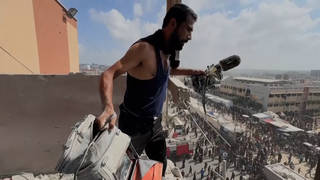
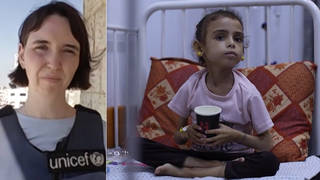
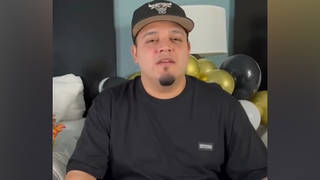
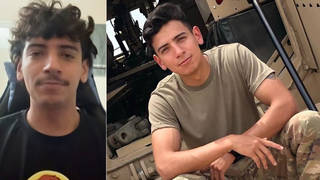





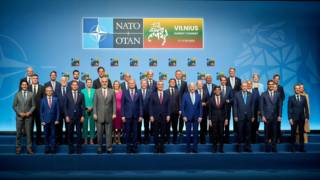
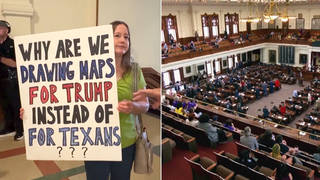
Media Options